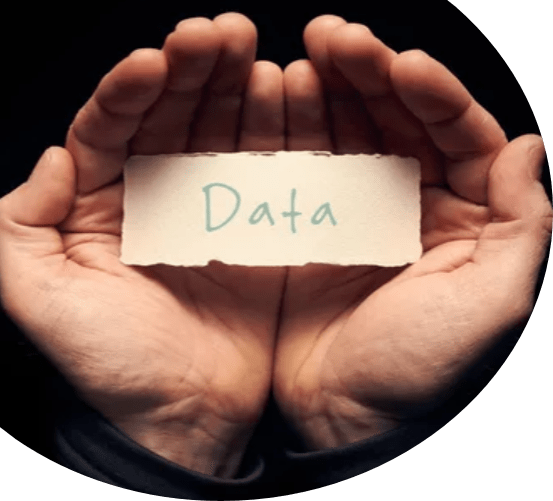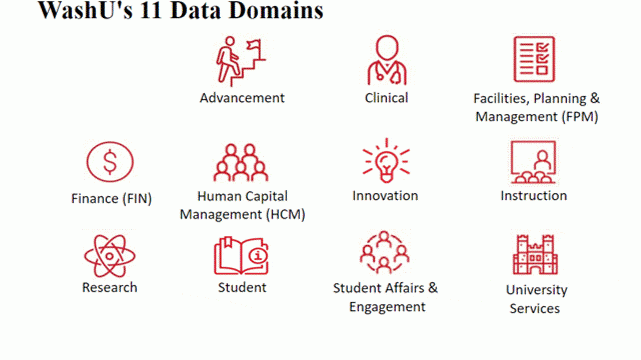
The Office of Data Governance (ODG) leads WashU’s Data Governance Program, through developing partnerships with Senior Leadership, Data Stewards, Data Coordinators & Data Partners who are most familiar with each Data Domain’s data.
Together, we strive for excellence in data accuracy, data consistency, and data integrity for our data, enabling better decisions through data confidence and data maturity.
What is a Data Domain?
A Data Domain is a logical grouping of data, referring to interrelated data pertaining to a common purpose, object, or concept. While Data Domains are aligned with data, they may be organized differently than our university organizational structure.
Each Data Domain is subdivided into Functional Areas to better share responsibilities and assign the appropriate data experts. For example, the HR domain is divided into Benefits, Compensation, Recruiting, Onboarding & Time Tracking, etc.

Student Domain
The Office of Data Governance (ODG) has partnered with the Student Sunrise project. The Student Sunrise mission is to replace the student information systems currently supporting WashU’s academic areas, reimagine operations in the academic and student support space, and seek to improve student outcomes and experiences during their time at WashU. The ODG is collaborating with student leadership to ensure data governance best practices are integrated in all aspects of data related activities to ensure the highest quality of accurate, complete and trusted data as a key deliverable. In addition, Collibra is WashU’s Data Intelligence platform will become our source of truth for business terms, acronyms, dashboards and other data artifacts to better serve WashU’s students, faculty, and academic staff.
What are Business Use Cases?
In addition to increasing data maturity, these foundational data governance capabilities will drive business outcomes. While data governance alone will not solve these use cases in their entirety, it is a key component to promoting business outcomes:
- Advancement – Where do our alumni live (by program) 10 years after graduation?
- Finance – What are the expenses by school or program?
- HCM – What in-house jobs have remained unfilled for over 4 months?
- Med School – What is total cost of care for an operation at the Medical School?
- Research – How long does it take to create and submit a grant proposal?
- Student – What are the demographic trends for majors over time?
Capabilities for Business Use Cases:
Key functionalities enabled thru data governance processes provides the foundation for enabling business use cases:
- Business Glossary: Accessible and consolidated list of business terminology and acronyms used throughout the University.
- Cataloging: Easily searchable inventory of data such as reports with contextual metadata, operational data, and data sharing agreements, aiding in understanding and applicability of data and its governance.
- Analytics Governance: Enabling anyone who produces analytics to see published analytics and work with analytics experts to correctly utilize analytics.
- Taxonomies: Definition of a governed categorized hierarchical structure of entities, especially data elements and data sets, enabling an understanding of what system the data is connected to, what a data element is called, the definition of the data element, and its downstream dependencies.
- Data Domains are high-level categories of Institutional Data which have been defined for the purpose of assigning accountability and responsibility for the data.
- Each one is aligned with a business function, like Research, Clinical, etc.
- Not a system or an application (Workday, Epic, RMS)
- Each domain will have one or multiple Data Administrators
- Each domain will determine who has access to data within that domain
- Data Stewards will make further determinations about access to sensitive data within each domain